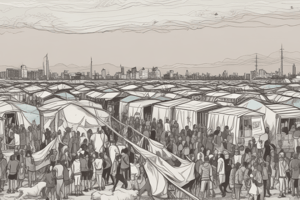Podcast
Questions and Answers
What do human rights aim to protect, regardless of various factors like nationality and religion?
What do human rights aim to protect, regardless of various factors like nationality and religion?
- Rights based on nationality
- Fundamental freedoms (correct)
- Freedoms based on religion
- Exclusive rights for citizens only
Which event formalized the concept of human rights, leading to the adoption of the Universal Declaration of Human Rights?
Which event formalized the concept of human rights, leading to the adoption of the Universal Declaration of Human Rights?
- World War II (correct)
- World War I
- The American Civil War
- The French Revolution
What is one common aspect covered by the Universal Declaration of Human Rights for all individuals?
What is one common aspect covered by the Universal Declaration of Human Rights for all individuals?
- Right to restrict religious practices
- Right to limit freedom of speech
- Right to discriminate based on sex
- Right to life, freedom of movement, and equality before the law (correct)
Why is it important to understand how human rights relate to refugees specifically?
Why is it important to understand how human rights relate to refugees specifically?
How do human rights contribute to the protection of refugees in the context of international migration?
How do human rights contribute to the protection of refugees in the context of international migration?
What is the significance of the growth of international migration and refugee movements in relation to universal human rights?
What is the significance of the growth of international migration and refugee movements in relation to universal human rights?
What is one significant issue faced by refugees without proper documentation?
What is one significant issue faced by refugees without proper documentation?
Which principle in international law aims to prevent the expulsion of individuals to dangerous situations based on certain criteria?
Which principle in international law aims to prevent the expulsion of individuals to dangerous situations based on certain criteria?
What does the Geneva Convention require asylum seekers to demonstrate in order to be granted refuge?
What does the Geneva Convention require asylum seekers to demonstrate in order to be granted refuge?
What action violates human rights when governments return asylum seekers directly across shared borders?
What action violates human rights when governments return asylum seekers directly across shared borders?
What is a key challenge faced by many refugees in terms of their legal status and integration into society?
What is a key challenge faced by many refugees in terms of their legal status and integration into society?
What is one reason governments may deny asylum seekers' claims based solely on country of origin?
What is one reason governments may deny asylum seekers' claims based solely on country of origin?
Study Notes
Refugees and Human Rights
Refugees have faced numerous challenges throughout history due to their displacement from their homes and countries. These individuals often face violations of their basic human rights, which is why it's essential to understand how these rights relate to refugees. In this article, we will explore what human rights entail and how they apply specifically to those who have been forced to flee their homelands.
What Are Human Rights?
Human rights refer to the inherent dignity and worth possessed by all members of the global community. They are fundamental freedoms intended to protect people regardless of nationality, ethnic origin, religion, sex, age, or any other status. This concept was formalized during World War II through the Universal Declaration of Human Rights adopted by the United Nations General Assembly in 1948. The declaration consists of 30 articles covering a broad range of civil liberties including the right to life, freedom of movement, and equality before the law.
The recognition of universal human rights has become increasingly important with the growth of international migration and refugee movements around the world. As such, understanding how refugees fit into this framework of rights can help ensure their protection and wellbeing while abroad.
Why Human Rights Matter to Refugees
When individuals are forced from their homes, they lose many things that most take for granted. Often, they leave behind possessions, relatives, friends, jobs, homes, and communities. Many refugees also suffer trauma, loss, fear, uncertainty, and confusion. Despite these losses, when people migrate under duress, leaving everything but themselves, they bring with them certain indivisible attributes—their humanity.
In theory, human rights exist so that everyone, everywhere in the world enjoys the highest possible standard of living; civil, political, economic, social, and cultural rights. For refugees, obtaining legal protection of their rights – especially access to identity documents – represents a significant step towards their full integration into society. Without proper documentation, refugees risk becoming invisible, unable to work legally, open bank accounts, enroll children in school, or even receive medical treatment.
Challenging Human Rights Violations Against Refugees
There are several ways in which refugees may experience human rights violations. One common example involves denial of asylum seekers’ claims based solely on country of origin, rather than individual circumstances. Additionally, some governments refuse entry to asylum seekers altogether, claiming they don't meet criteria set out in the Geneva Convention – namely that applicants must show reasonable grounds for believing that they would be persecuted if returned home.
Another issue arises when states fail to provide adequate reception facilities, closing borders without ensuring safe alternatives for asylum seekers. Some governments have gone further still, returning asylum seekers directly back across shared land borders, meaning they could potentially return straight into danger. Such actions run counter to the principle of non-refoulement in international law, whereby signatory nations agree not to expel anyone to situations where there exists a real risk of torture, cruel and degrading treatment, or punishment because of race, religion, nationality, membership of a particular social group, or political opinion.
Moreover, some countries offer temporary protection only to selected groups deemed vulnerable enough to warrant assistance. However, this approach does nothing to address broader issues facing all refugees nor provides comprehensive solutions. A viable solution requires looking beyond simply granting temporary protection, recognizing that every single person seeking safety deserves respect and protection as a matter of course.
Conclusion
As the UN High Commissioner for Refugees pointed out, 'humanitarian aid itself cannot solve the crisis'. Instead, addressing the root causes leading people to leave their homes in search of security and stability remains crucial. By supporting efforts aimed at preventing conflicts, fostering peace, promoting tolerance, and preserving the environment, we can create conditions conducive to sustainable development and reduced need for mass population displacements.
Studying That Suits You
Use AI to generate personalized quizzes and flashcards to suit your learning preferences.
Description
Explore the relationship between refugees and human rights, including the fundamental freedoms that protect individuals regardless of their circumstances. Learn about the challenges refugees face, such as violations of their basic rights and the importance of legal protection in ensuring their wellbeing while displaced.




